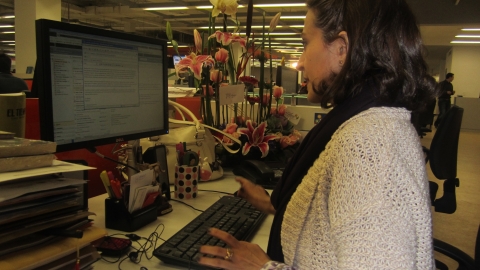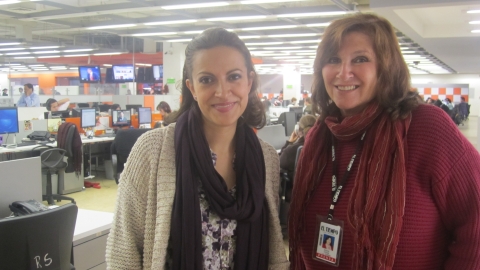
El Tiempo reporter Jineth Bedoya Lima is receiving this year's International Women of Courage award for her coverage of women and violence in Colombia.

Knight Fellow Ronnie Lovler (left) says she is lucky to work alongside Jineth Bedoya Lima in the El Tiempo newsroom.
There are more than 300 journalists working in the converged media newsroom of ICFJ partner El Tiempo, but one stands out – not just as an award-winning journalist but also because of the trauma and travails she has survived along the way.
It was 2000 and Jineth Bedoya Lima, then just 26-years-old, was covering a story about arms smuggling at La Modelo prison in Bogota for El Tiempo newspaper, where she is now deputy justice editor. When Bedoya Lima left the prison, she was seized by a group of paramilitaries who gang raped her.
Fast forward to March 2012 when Bedoya Lima, now 37, joined nine other women in Washington, D.C., to receive the U.S. government’s International Women of Courage award.
“The day I got the call from the Department of State, I was in shock. I felt so many emotions, crying and all, I didn’t know what to think,” she said. “I can’t describe the feeling of being alongside some of the most important women in the world … a Nobel Prize winner, Michelle Obama, Hillary Clinton. I was so proud to be there,” she added.
Bedoya Lima sits one aisle over from my desk in the El Tiempo newsroom. I have gotten to know her a bit as an Knight International Journalism Fellow working on a crowdsourced mapping project with partner El Tiempo. Lucky me and lucky everyone who has a chance to interact with Bedoya Lima and to see her in action.
I remember watching her in the newsroom the day Alfonso Cano, leader of the Revolutionary Armed Forces of Colombia (FARC), was killed by government forces in southern Colombia. Phone calls, more phone calls, on the computer, conversations with colleagues and then writing the story. To track that story, she broke away from her preparations for an El Tiempo-sponsored multimedia special on women and violence. Now, Bedoya Lima, who has authored three books, is overseeing production of another special on the same topic for the latter half of the year.
“I’m lucky I have always had the backing of El Tiempo,” said Bedoya Lima. Indeed, El Tiempo stands by her, to this day providing her with round-the-clock security and an armored car. Bedoya Lima began telling her story globally in 2009, after she was contacted by the humanitarian organization Oxfam to be their spokesperson in a campaign against women and violence. She said no at first, for the “same reason that most women who have been raped might not want to speak out, because of shame or feeling stigmatized. But then I thought about it some more and I thought, I had a chance to talk and I could talk for all the other women out there who can’t speak out,“ she said.
Still her work as a journalist hardly falls by the wayside. Right now she is investigating stories about drug trafficking, organized crime, and of course, women and violence. “I feel equally committed to journalism and the issues of violence again women. What I have been able to do for women, I do through being a journalist, so I have an equal commitment to both,” she said.